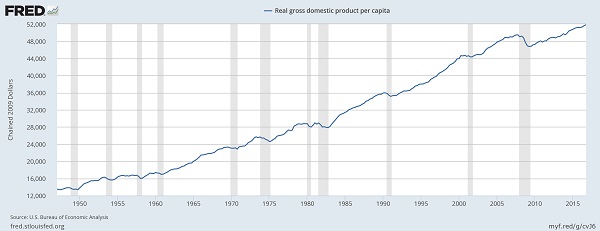There is a new think tank in town: the Archbridge Institute,
led by Gonzalo Schwarz, formerly of the Atlas Network. Their work
focuses on economic mobility around the world. They recently released a study by Scott Winship, the first in a three-part series examining the issue. His primary finding is that relative
mobility in the U.S. isn’t very strong—children born into middle class
families tend to stay middle class, and children born into poor families
tend to stay poor. But what about absolute mobility? The executive summary states:
The Archbridge approach also ties into what scholars ranging from Steven Pinker to Deirdre McCloskey to Matt Ridley to Angus Maddison to Angus Deaton to Julian Simon have been saying for decades: people will make themselves better off over time, if they’re allowed to.
There have been starts and stutters, and advances and reversals. Nobody knows what will happen next. But the long-term trajectory is up. It has been for two centuries and counting. This is to the benefit of the poor. Even if they remain relatively poor compared to the rich—remember that every statistical distribution must have top and bottom percentiles, giving more job security to Piketty-style academics than tenure itself—real people are becoming better off, ratios be damned.
For example, the chart pictured here shows per-person GDP in the U.S. over a 70-year period, 1947 to now. People wax nostalgic about the 1950s. But if the choice was actually presented, most people would rather have today’s medical technology, social tolerance, air conditioning, HDTVs, communications technology, restaurants, travel opportunities, and most everything else, over what our 1950s ancestors had. Where would you rather live? Interested readers can find a lot more on this point in The Rising Tide.

Economic mobility is important. Anyone with an idea should be able to build a business around it, whether they were born rich or poor. One of modernity’s greatest achievements is ending the old feudal Great Chain of Being, where everyone had their place and could never leave it.
After all, the whole point of going into business is to provide value for other people. Why stop people from helping each other, even if they were born poor?
The best way to encourage more economic mobility is to foster a cultural and regulatory environment where innovation, openness, and change are encouraged, not crushed. I look forward to seeing the next papers in Archbridge’s series. The first paper is here.
[R]oughly three in four adults—and the
overwhelming majority of poor children—live better off than their
parents after taking the rising cost of living into account.
That’s good news. The remaining tasks are to make sure the one in
four who aren’t better off than their parents become so, and to keep the
process going. This approach pairs well with Iain Murray’s and my 2016
papers on inequality, People, Not Ratios and The Rising Tide. If the goal is to make the worst off better off, markets must be free enough to allow people to make that happen.The Archbridge approach also ties into what scholars ranging from Steven Pinker to Deirdre McCloskey to Matt Ridley to Angus Maddison to Angus Deaton to Julian Simon have been saying for decades: people will make themselves better off over time, if they’re allowed to.
There have been starts and stutters, and advances and reversals. Nobody knows what will happen next. But the long-term trajectory is up. It has been for two centuries and counting. This is to the benefit of the poor. Even if they remain relatively poor compared to the rich—remember that every statistical distribution must have top and bottom percentiles, giving more job security to Piketty-style academics than tenure itself—real people are becoming better off, ratios be damned.
For example, the chart pictured here shows per-person GDP in the U.S. over a 70-year period, 1947 to now. People wax nostalgic about the 1950s. But if the choice was actually presented, most people would rather have today’s medical technology, social tolerance, air conditioning, HDTVs, communications technology, restaurants, travel opportunities, and most everything else, over what our 1950s ancestors had. Where would you rather live? Interested readers can find a lot more on this point in The Rising Tide.

Economic mobility is important. Anyone with an idea should be able to build a business around it, whether they were born rich or poor. One of modernity’s greatest achievements is ending the old feudal Great Chain of Being, where everyone had their place and could never leave it.
After all, the whole point of going into business is to provide value for other people. Why stop people from helping each other, even if they were born poor?
The best way to encourage more economic mobility is to foster a cultural and regulatory environment where innovation, openness, and change are encouraged, not crushed. I look forward to seeing the next papers in Archbridge’s series. The first paper is here.
No comments:
Post a Comment
Note: Only a member of this blog may post a comment.